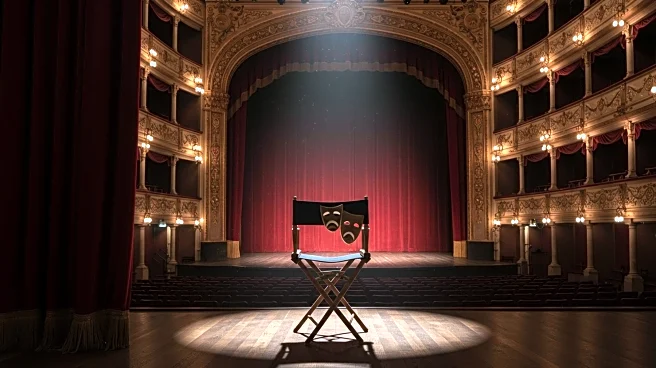What's Happening?
Andrew Lloyd Webber, renowned composer of musicals such as 'The Phantom of the Opera' and 'Cats,' is undergoing a significant transformation in his career and business operations. Following the challenges posed by the COVID-19 pandemic, which led to the closure of theaters and declining ticket sales, Lloyd Webber has initiated a dramatic overhaul of his theater company, The Really Useful Group, now renamed LW Entertainment. This change is part of a broader strategy to diversify the company's focus beyond live theater into areas like gaming, movies, and consumer products. Lloyd Webber has also embraced collaborations with younger directors, leading to successful revivals of his classic shows, including 'Evita' and 'Sunset Blvd.'
Why It's Important?
The transformation of Andrew Lloyd Webber's company reflects a broader trend in the entertainment industry where traditional theater is expanding into multimedia platforms. This shift is crucial for sustaining the relevance and financial viability of theatrical productions in a post-pandemic world. By diversifying into areas such as gaming and film, LW Entertainment aims to tap into new revenue streams and reach wider audiences. This move could set a precedent for other theater companies facing similar challenges, highlighting the importance of innovation and adaptation in the arts sector. The success of recent revivals also underscores the enduring appeal of Lloyd Webber's work, potentially attracting a new generation of theatergoers.
What's Next?
LW Entertainment plans to continue its expansion into various media, with projects like a new movie adaptation of 'The Phantom of the Opera' and an anime series based on the same musical. The company is also exploring opportunities in publishing, with a multibook deal with Penguin Random House. As LW Entertainment evolves, it will likely face challenges in balancing traditional theater with new media ventures. The success of these initiatives will depend on the company's ability to innovate while maintaining the integrity of Lloyd Webber's original works. Additionally, the potential impact of changes in Broadway's tax credit program could influence future productions and their viability.
Beyond the Headlines
The overhaul of LW Entertainment raises questions about the future of theater in a digital age. As the company ventures into new media, it must navigate ethical considerations related to the commercialization of artistic works. The shift also highlights cultural dynamics, as Lloyd Webber's musicals are reimagined to resonate with contemporary audiences. This transformation could lead to long-term shifts in how theater is produced and consumed, potentially influencing global entertainment trends. The involvement of Lloyd Webber's family in the business suggests a commitment to preserving the legacy of his work while adapting to modern demands.









